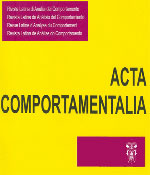Probabilistic leaming under different adjustment criteria
Main Article Content
Abstract
Two experiments were carried out in order to evaluate the differential effect of instructions prompting four distinctive adjustment criteria in a probabilistic Iearning task with children and university students. Four different choice tasks were used, each one under a different probability: 0.5-0.5 random, 0.8-0.2 random, 0.5-0.5 not random, and 0.8-0.2 not random. Instructions informed about different acceptance criteria for adjustment: by dogma, by training, by reference and by faith. No differential effects of instructions on performance were observed. The percentaje of correct responses and choice patterns varied according to the probability values and their distribution. These results are discussed distinguishing amont effective adjustment and predictive adjustment.
Downloads
Article Details

<a rel="license" href="http://creativecommons.org/licenses/by-nc-sa/4.0/"><img alt="Licencia de Creative Commons" style="border-width:0" src="https://i.creativecommons.org/l/by-nc-sa/4.0/88x31.png" /></a><br />Este obra está bajo una <a rel="license" href="http://creativecommons.org/licenses/by-nc-sa/4.0/">licencia de Creative Commons Reconocimiento-NoComercial-CompartirIgual 4.0 Internacional</a>.
